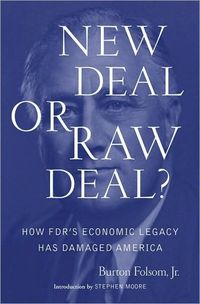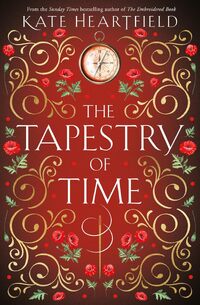

Purchase
How FDR's Economic Legacy Has Damaged America
Threshold Editions
November 2008
On Sale: November 4, 2008
320 pages
ISBN: 1416592229
EAN: 9781416592228
Hardcover
Add to Wish List
Non-Fiction History
A sharply critical new look at Franklin D. Roosevelt's
presidency reveals government policies that hindered
economic recovery from the Great Depression -- and are
still hurting America today. In this shocking and groundbreaking new book, economic
historian Burton W. Folsom exposes the idyllic legend of
Franklin D. Roosevelt as a myth of epic proportions. With
questionable moral character and a vendetta against the
business elite, Roosevelt created New Deal programs marked
by inconsistent planning, wasteful spending, and
opportunity for political gain -- ultimately elevating
public opinion of his administration but falling flat in
achieving the economic revitalization that America so
desperately needed from the Great Depression. Folsom takes
a critical, revisionist look at Roosevelt's presidency,
his economic policies, and his personal life. Elected in 1932 on a buoyant tide of promises to balance
the increasingly uncontrollable national budget and reduce
the catastrophic unemployment rate, the charismatic thirty-
second president not only neglected to pursue those goals,
he made dramatic changes to federal programming that
directly contradicted his campaign promises. Price fixing,
court packing, regressive taxes, and patronism were all
hidden inside the alphabet soup of his popular New Deal,
putting a financial strain on the already suffering lower
classes and discouraging the upper classes from taking
business risks that potentially could have jostled
national cash flow from dormancy. Many government programs
that are widely used today have their seeds in the New
Deal. Farm subsidies, minimum wage, and welfare, among
others, all stifle economic growth -- encouraging
decreased productivity and exacerbating unemployment. Roosevelt's imperious approach to the presidency changed
American politics forever, and as he manipulated public
opinion, American citizens became unwitting accomplices to
the stilted economic growth of the 1930s. More than sixty
years after FDR died in office, we still struggle with the
damaging repercussions of his legacy.
Comments
No comments posted.
Registered users may leave comments.
Log in or register now!
| 


 © 2003-2025 off-the-edge.net
all rights reserved Privacy Policy
© 2003-2025 off-the-edge.net
all rights reserved Privacy Policy